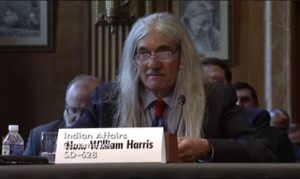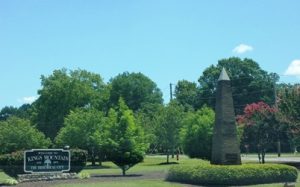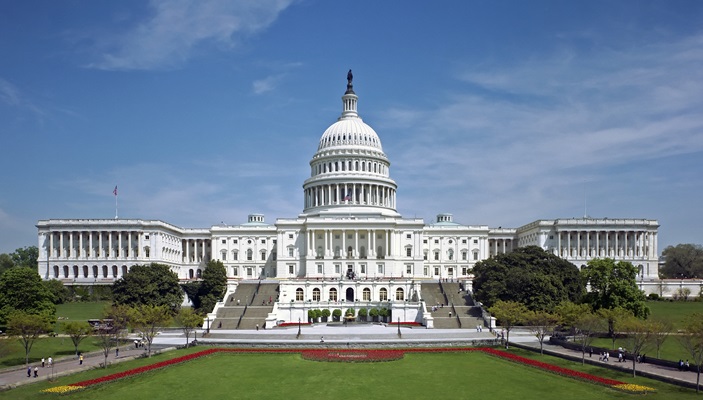In an effort to acquire a plot of land off of Dixon School Road to use for the construction of a casino in Kings Mountain, North Carolina, Catawba Indian Nation Chief Bill Harris recently appeared before the U.S. Senate Committee on Indian Affairs to help facilitate that goal.
The Capitol Hill hearing comes on the heels of a bill that was introduced on March 13, 2019, by Sen. Lindsey Graham of South Carolina.
Ambiguous language:
S.790 (pdf) would clarify certain provisions in Public Law 103–116, the Catawba Indian Tribe of South Carolina Land Claims Settlement Act of 1993 regarding how the land in Kings Mountain that the tribe considers part of their ancestral home can be used.
According to The Shelby Star newspaper…
The federally recognized tribe wants to acquire a 16-acre plot of land off of I-85 for the construction of a casino in the small suburban city of just under 11,000 for the purposes of building a casino resort. The proposed casino would help the tribe and the local economy, and could provide an investment of between $300 million and $600 million and some 4,000 jobs, said Harris (pictured below).

“This committee has a chance to right a historical wrong”
In written testimony at the May 1, 2019, Capitol Hill hearing, Harris said…
“This project will spark extraordinary economic development, providing critically needed employment in a hard hit area of North Carolina and South Carolina (the project is only a mile from the state border), in addition to allowing the Catawba to become economically self-sufficient.”
Promise unkept:
In changing the language of the land act the tribe entered into in 1993, the bill introduced by Senator Graham, along with North Carolina Sens. Thom Tillis and Richard Burr, who are co-sponsors, would allow some of the policies of the Federal Bureau of Indian Affairs to be bypassed, and the trust could then be approved by Congress.
While the Tribe was promised – via the land act – a reservation up to 4,200 acres, to date they have the same 1,017-acre reservation they had when the act became law 26 years ago, Chief Harris said in his May 1 testimony.
It’s also been more than five years since the Catawba Tribe submitted a land-into-trust application for the site, but the Bureau of Indian Affairs (BIA) has yet to publicly issue a decision. That inactivity reportedly served as a catalyst for Senator Graham’s introduction of S790, and hopefully the resolution of any uncertainties regarding the 1993 act.
Poor drafting:
Senator Graham, who is not a committee member, but was reportedly invited to present a statement during the legislative hearing, said on Wednesday…
“The tribe is locked in poverty and the tribe’s understanding that it had negotiated to acquire land within its Congressionally-established service area in North Carolina has been disputed, largely due to poor drafting of the act.”

Graham went on to say that it was understood by all the key negotiators in the settlement act that the Catawba Indian Nation “could make mandatory acquisitions in its North Carolina service area, and have signed written statements to that effect.” He explained that is what was intended, but that the language of the act “has been deemed ambiguous on the tribe’s right to make limited land acquisitions in that state.”
Righting a wrong:
The South Carolina senator goes on to state that the bill introduced by him and the two North Carolina senators is to “right that wrong.” And that the bill “specifically gives the Secretary the authority to make that decision.” He added that in a sense, it [the bill] is a “technical correction” and does nothing more than allow the tribe to do what Congress envisioned.
Graham wrapped up his statement by saying that while the legislation alone won’t put right the “long history of the Catawba Indians being taken for granted,” it will, however, be a “giant step forward to empower them.” And that the government’s promise of a bright future has been denied the Catawba people through a “tortured legal process,” leaving them with “little to show for their giving up their land claims and treaty rights.”
The tribe’s growth has also reportedly been limited due to having to pay the local public school system in what commercial land they’ve had so their children could attend school. Harris said, “This committee has a chance to right a historical wrong.”
Location is everything:
Harris was questioned about why the tribe wants to build a casino in North Carolina rather than in South Carolina where their reservation is located. He reportedly told the committee, “We are staying in our heartland,” and went on to explain that South Carolina has on two occasions denied the tribe due to the southeastern U.S. state’s regulations on gambling.
The 17-acre site located Cleveland County, which is within the ‘service area’ as defined by Congress, is considered by the Catawba Indian Nation to be part of its ancestral land. It’s situated just under 50 miles from their tribal headquarters in South Carolina.
There are currently two casinos in North Carolina, both of which are owned by the Eastern Band of Cherokee Indians. In 1997, Harrah’s Cherokee Casino opened and in the latter part of 2015, Harrah’s Cherokee Valley River Casino near Murphy opened. Las Vegas-headquartered Caesars Entertainment Corporation manages both casinos.
Those opposed:

Despite earlier opposition by then-Governor Pat McCrory, other North Carolina officials, and ‘Say NO to a Casino in Cleveland County,’ a Facebook group currently led by Alton Beal, President at Ambassador Baptist College, overall, public opinion seems to be in support of the casino.
However, the Eastern Band of Cherokee Indians reportedly joined the opposition when S790 was introduced. According to earlier reports, the federally recognized tribe is not happy with the actions of Graham.
A statement from the Cherokee tribe read…
“The Department of the Interior — under both Obama and Trump administrations — rejected the Catawba Nation’s claims that the Department must take North Carolina lands into trust for the South Carolina Tribe. The proposed casino off of I-85 in Cleveland County would encroach upon Cherokee aboriginal territory — territory ceded by the Cherokee by treaty, and territory recognized as Cherokee territory by the U.S. Indian Claims Commission. The Catawba have no valid aboriginal or historical claim to Cleveland County,” according to The Shelby Star.
Both of the Eastern Cherokees’ casino properties are located in the far western part of North Carolina, over 130 miles from the site where the Catawba Nation seeks to open its gaming establishment.



